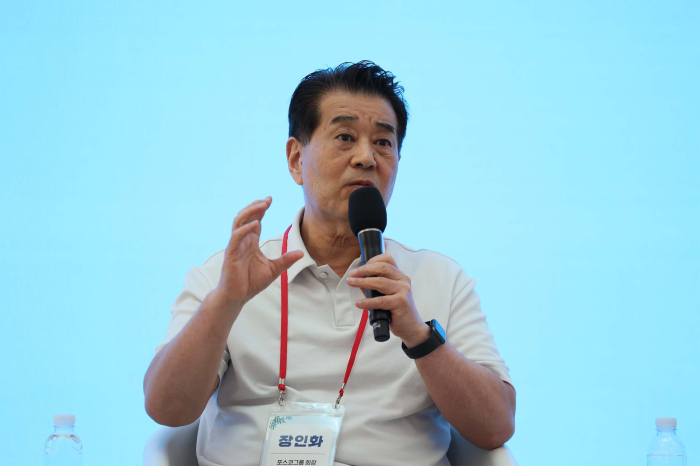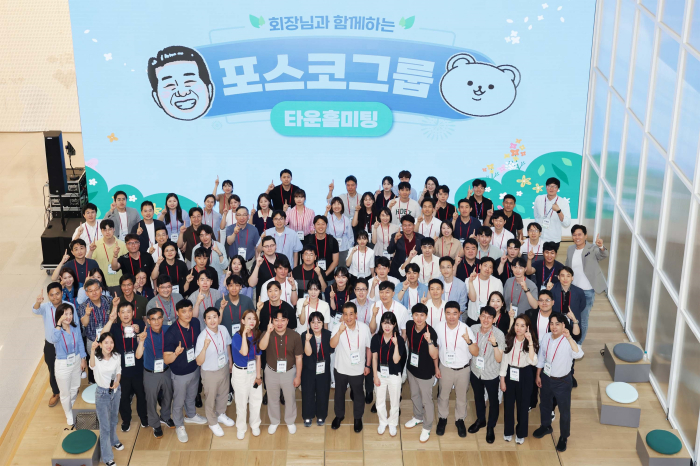POSCO aims to quadruple operating profits by 2030
The steel giant will nurture the materials business for future mobility and aircraft as a new growth driver
By Jul 02, 2024 (Gmt+09:00)
Samsung steps up AR race with advanced microdisplay for smart glasses


When in S. Korea, it’s a ritual: Foreigners make stops at CU, GS25, 7-Eleven


Maybe Happy Ending: A robot love story that rewrote Broadway playbook


NPS yet to schedule external manager selection; PE firms’ fundraising woes deepen


US auto parts tariffs take effect; Korea avoids heavy hit



POSCO Group, South Korea’s No. 1 steelmaker, has set an ambitious goal of quadrupling its operating profits and doubling revenue by 2030 with a focus on steel products and rechargeable battery materials, as well as aerospace materials.
The drastic profit growth, if achieved, is expected to nearly triple the combined market capitalization of its subsidiaries, including POSCO Holdings Inc. and POSCO Future M Co., to 200 trillion won ($144 billion) by 2030 from the current 70 trillion won, POSCO Holdings said on Tuesday.
In a town hall meeting with 100 employees of POSCO units on Monday, POSCO Group Chairman and Chief Executive Chang In-hwa unveiled the goals, envisioning becoming the world's No. 1 materials supplier for both rechargeable batteries and next-generation industries.
The town hall meeting was hosted to celebrate the 100th day of Chang’s inauguration as the group chairman and to review the progress the group has made to cut costs and improve operational efficiency. As part of such efforts, it has been scaling back businesses where it is losing money, or sees no growth potential.
STEEL
For its mainstay steel business, its cost-cutting and efficiency improvement efforts paid off, reducing costs and creating additional revenue by a combined 230 billion won since Chang took the helm of the group, POSCO said in a statement.
POSCO’s steel business is focused on India and North America.
Its emission reduction technology, dubbed hydrogen reduction ironmaking (HyREX) technology, is transforming the steel giant into an eco-friendly company, POSCO added. The technology, developed by POSCO, uses hydrogen instead of fossil fuels to make steel products.

BATTERY MATERIALS
To diversify the sources of raw materials and sales channels, POSCO has invested in salt lakes and mines containing lithium in Chile and Argentina, while collaborating with mining and resource companies in North America and Australia.
In developed markets, it concentrates on materials for ternary lithium batteries made of nickel-cobalt-manganese (NCM), nickel-cobalt-manganese-aluminum (NCMA) and nickel-cobalt-aluminum (NCA). In emerging markets, it focuses on lithium iron phosphate battery materials.
MATERIALS FOR NEW BUSINESSES
Materials for future mobility, aircraft and spacecraft will become POSCO's new growth driver. By 2030, it aims to generate more than 5 trillion won in sales from the materials for next-generation industries.
To build its presence in those segments, POSCO is pursuing mergers and acquisitions.
CORPORATE GOVERNANCE
To ensure independent and transparent management, POSCO launched the Governance Innovation Task Force team when Chang took over as chairman in April this year.
Achieving fair and transparent corporate governance is one of the seven key missions he promised in April to pursue during his term.
POSCO is seeking to strengthen the independence of its board, including in selecting outside directors and evaluation of the company’s management. Chang also has pledged to introduce a system to foster a pool of CEO candidates.
Write to Woo-Sub Kim at duter@hankyung.com
Yeonhee Kim edited this article.
-

-
 BatteriesPOSCO seeks additional lithium deals from Argentina, Chile
BatteriesPOSCO seeks additional lithium deals from Argentina, ChileJun 17, 2024 (Gmt+09:00)
3 Min read -
 EnergyPOSCO, Hancock to invest $432 mn in Senex's LNG production
EnergyPOSCO, Hancock to invest $432 mn in Senex's LNG productionJun 04, 2024 (Gmt+09:00)
1 Min read -
 Corporate investmentShinhan, POSCO invest $20 mn in Australian hydrogen startup Hysata
Corporate investmentShinhan, POSCO invest $20 mn in Australian hydrogen startup HysataMay 10, 2024 (Gmt+09:00)
2 Min read -
 Corporate strategyPOSCO tightens belts, seeks M&A within 3 years: new chairman
Corporate strategyPOSCO tightens belts, seeks M&A within 3 years: new chairmanApr 23, 2024 (Gmt+09:00)
3 Min read -
 BatteriesPOSCO new chief vows to keep fostering battery materials business
BatteriesPOSCO new chief vows to keep fostering battery materials businessMar 21, 2024 (Gmt+09:00)
3 Min read -

-
 MachineryPOSCO International to build motor core plants in Poland, Mexico
MachineryPOSCO International to build motor core plants in Poland, MexicoFeb 26, 2024 (Gmt+09:00)
2 Min read -
 BatteriesPOSCO to build world's largest battery cathode plant cluster
BatteriesPOSCO to build world's largest battery cathode plant clusterFeb 22, 2024 (Gmt+09:00)
2 Min read -

-
 BatteriesPOSCO Future M to sharply raise synthetic graphite output
BatteriesPOSCO Future M to sharply raise synthetic graphite outputJan 17, 2024 (Gmt+09:00)
2 Min read -
 ESG bondsSteel giant POSCO raises $500 mn in 3-year green bonds
ESG bondsSteel giant POSCO raises $500 mn in 3-year green bondsJan 17, 2024 (Gmt+09:00)
1 Min read -
 Shareholder activismNPS chief questions fairness in POSCO’s CEO selection process
Shareholder activismNPS chief questions fairness in POSCO’s CEO selection processDec 29, 2023 (Gmt+09:00)
3 Min read


